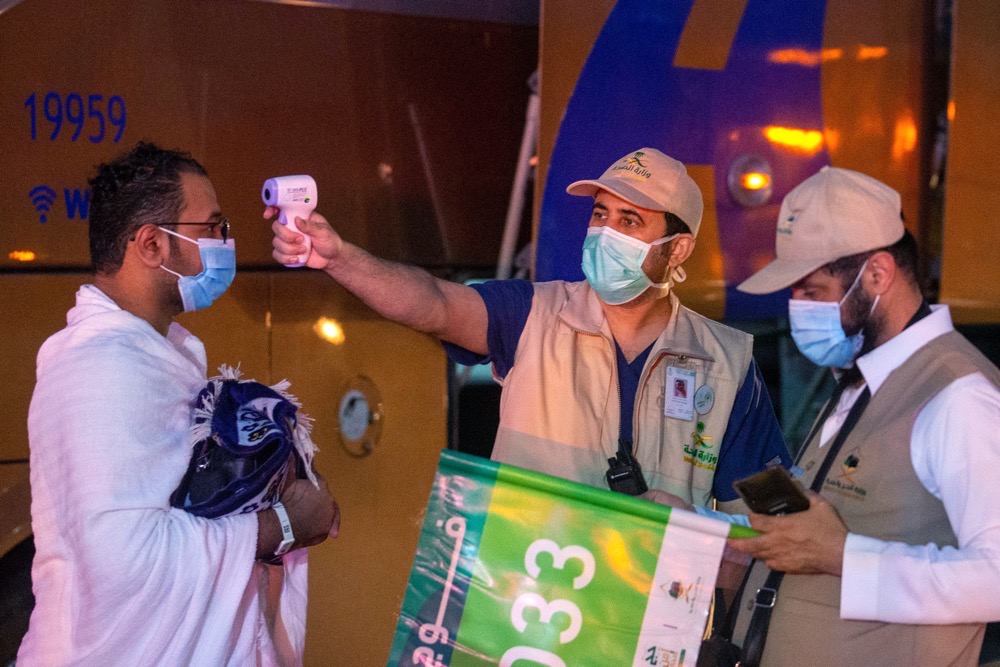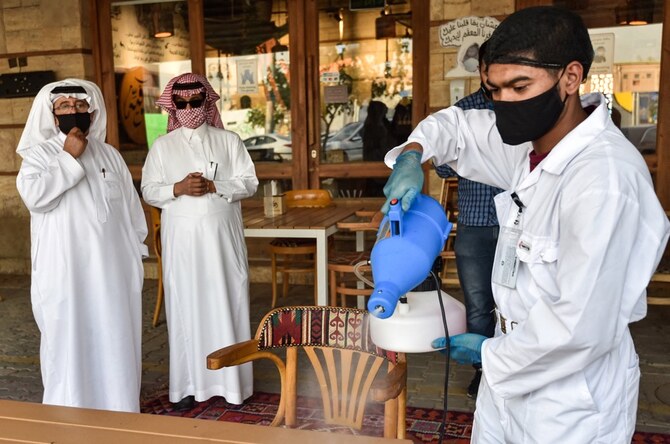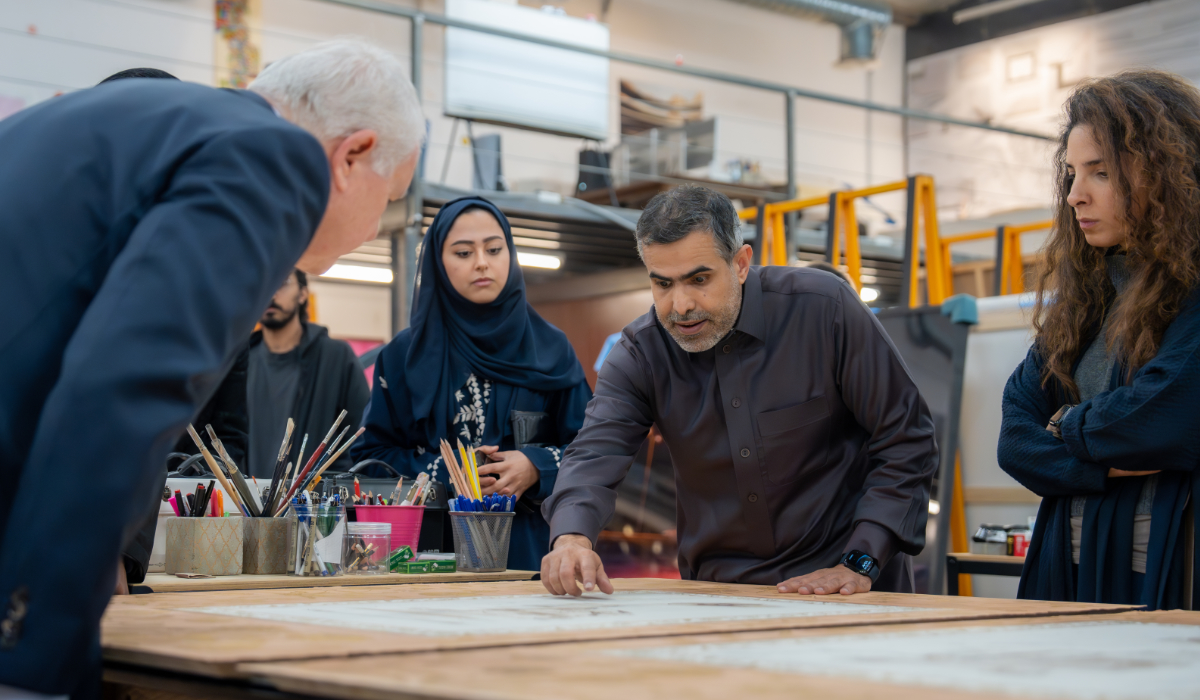RIYADH: Saudi Arabia is well-prepared to stave off a potential outbreak of mpox, formerly known as monkeypox, should the aggressive new variant of the virus spread to the Kingdom, a health professional told Arab News.
On Aug. 14, the World Health Organization classified an outbreak of mpox in the Democratic Republic of Congo as a public health emergency of international concern, prompting fears of a regional epidemic or even a global pandemic.
“The current upsurge of mpox in parts of Africa, along with the spread of a new sexually transmissible strain of the (mpox) virus, is an emergency not only for Africa but for the entire globe,” said Dimie Ogoina, the chair of WHO’s mpox emergency committee.
“Mpox, originating in Africa, was neglected there and later caused a global outbreak in 2022. It is time to act decisively to prevent history from repeating itself.”
In an interview with Al-Arabiya on Thursday, Dr. Alaa Al-Ali, a Saudi infectious diseases consultant, echoed the WHO official’s comments.
“The issue of (mpox) is different from the coronavirus,” he said. “It (mpox) was eradicated in 1980 before returning due to the ‘negligence’ of some.”
An international outbreak of a milder variant of mpox occurred between July 2022 and May 2023. The first cluster of cases was reported in the UK, followed soon after by more in other parts of the world, including Europe and North America. It was the first time that a transmission chain had been reported outside of Africa without any known epidemiological links to West or Central Africa. In all, 87,000 cases were reported in 111 countries, and 140 people died.

In the event of an outbreak, authorities in the Kingdom are prepared to provide guidance on how to prevent infection. (AFP/File)
Although there have been no confirmed cases of the new variant of mpox in Saudi Arabia yet, authorities in the Kingdom were said to be well-prepared to contain any outbreak, following successful responses to the previous mpox scare and the COVID-19 pandemic.
“Health surveillance and precautions are in place at all health outlets and facilities to ensure that it does not spread,” Dr. Ghada Ali Al-Qudaihi, a Saudi epidemiologist and the director of clinical affairs at Qatif Health Network, told Arab News.
In the event of reports of any suspected or confirmed cases, health authorities in the Kingdom are ready to implement several measures to help prevent the spread of the disease. The first involves monitoring and immediate reporting of the situation to ensure early detection of cases.
“There is a specific epidemiological surveillance that focuses on monitoring people who have been in contact with wild animals or who have traveled to areas where the virus is prevalent,” said Al-Qudaihi.
As soon as an infected or at-risk patient is identified, medical isolation immediately follows. In some cases, people who have been in close contact with the patient might also be quarantined. Preventative measures in the form of personal protective equipment are provided to all medical staff and strict sterilization standards are applied to prevent any spread of the disease.
Even after treatment is completed, patients continue to be monitored periodically to ensure they recover fully and to prevent any potential spread of infection. The Ministry of Health is also ready to launch awareness campaigns to alert and educate the public about mpox, how it can be passed on and the vital importance of reporting any suspected cases.
In the event of an outbreak, authorities in the Kingdom are prepared to provide guidance on how to prevent infection, such as avoiding contact with wild animals or eating meat that might be infected in an unsanitary manner. Accurate information about the disease and prevention is also ready for distribution through media organizations and on social media.
“Hospitals and doctors in Saudi Arabia are highly prepared to treat and contain” mpox, said Al-Qudaihi. “The Kingdom has well-equipped laboratories, health centers and hospitals to diagnose and treat infectious diseases,” including mpox.
To meet the standards for disease control, hospitals in Saudi Arabia are required to follow strict infection-prevention protocols and are required to immediately report suspected cases. The Ministry of Health has rapid-response teams ready to handle any outbreaks of infectious diseases, Al-Qudaihi added.

Special measures are already in place to monitor and prevent the spread of infectious diseases among pilgrims. (AFP/File)
Saudi Arabia also cooperates with international health organizations, such as the WHO, to follow up on the latest global developments and guidelines regarding mpox and other diseases.
Given the large number of visitors to the Kingdom during the Hajj and Umrah seasons in particular, special measures are already in place to monitor and prevent the spread of infectious diseases among pilgrims.
These include enhanced healthcare services and the implementation of quarantine procedures when necessary. Field hospitals and medical clinics are also provided, which are fully equipped to provide immediate care to pilgrims and other visitors.
Saudi Arabia’s Public Health Authority, also known as Weqaya, issued a statement on Saturday reassuring the public that the Kingdom is fully prepared to deal with and contain any potential outbreak.
“Weqaya emphasizes the strength and effectiveness of the Kingdom’s health sector, which is well-prepared to confront different health risks,” it said.
“The Kingdom has taken comprehensive preventive measures to enhance monitoring, prevent the spread of the virus and safeguard the population’s health.”
Opinion
This section contains relevant reference points, placed in (Opinion field)
According to the European Center for Disease Prevention and Control, there have been 14,151 suspected cases of the new strain of mpox, known as Clade Ib, in the Democratic Republic of Congo this year alone, and more than 2,600 confirmed cases. Elsewhere in the region, there have been 165 suspected cases in Burundi, 223 in the Central African Republic, and 150 in Congo. Four cases have been confirmed in Rwanda, two in Uganda, and one in Kenya.
Three cases have been reported outside of Africa. Swedish authorities confirmed the first case in the country on Aug. 15. The following day, another was confirmed in Pakistan. On Monday, the disease was detected in a patient in the Philippines with no history of foreign travel.
Mpox was first identified in humans in the Democratic Republic of Congo in 1970. The disease is similar to human smallpox but not considered as dangerous, and two forms of the virus have been discovered. The symptoms can include a fever, headache, muscle and joint pain, swollen lymph nodes, and a general feeling of weakness and fatigue. A rash, which usually appears between one and three days after the onset of fever, begins as red spots that become fluid-filled blisters. The rash often starts on the face and spreads to other parts of the body.

As soon as an infected or at-risk patient is identified, medical isolation immediately follows. (AFP/File)
Al-Qudaihi said mpox “can be dangerous for people with weakened immune systems and for children. Some complications may occur, which may include secondary skin infections, pneumonia and encephalitis.”
Mpox is typically transmitted in one of three ways: direct contact with the bodily fluids or open blisters of an infected person; respiratory droplets, usually through close contact; and through direct contact with infected animals, including monkeys, rodents and some other wild animals, or by eating undercooked infected meat.
“Monkeypox is treatable but there is no fixed treatment specifically directed at the virus,” said Al-Qudaihi. “Treatment focuses mainly on relieving symptoms and supporting the patient until their body recovers from the virus.”
The most important steps for recovery include isolation and preventative care, “especially in the early stages when the rash is visible,” Al-Qudaihi added.
“During this period, preventative measures must be used, including hand washing and using personal protective equipment such as gloves and masks, and disinfecting all tools and surfaces.”
The next step is management of symptoms, including treatment to reduce fever and pain using medications such as ibuprofen and paracetamol. The patient needs to take plenty of fluids to stay hydrated, especially if they have a high fever.
There is also a focus on the prevention of secondary infections by thoroughly cleaning wounds, blisters and the skin in general, and applying antiseptic ointment if there is inflammation or contamination. Recovery is supplemented with balanced nutrition, medical monitoring and follow-ups, and psychological and social support.
“The duration of the disease usually ranges from two to four weeks,” said Al-Qudaihi. “In general, the recovery rate from mpox is high, and many patients recover completely within a few weeks and without permanent complications.”
The mortality rate can vary, however, depending on the strain of the virus and the existing health of the infected person. A form known as Clade Ib, which is endemic to Central Africa, for example, has a higher mortality rate, of about 10 percent, compared with Clade II, which is endemic to West Africa and has a mortality rate of less than 1 percent.
Other factors that can play a major role in the chances of recovery include the age of the patient, the state of their immune system, and the medical care they receive.

Saudi health authorities issued a statement on Saturday reassuring the public. (AFP/File)
Al-Qudaihi said mpox does not spread easily between humans compared with other diseases such as influenza or COVID-19, and is preventable if people follow a set of general guidelines: avoid direct contact with animals that might carry the virus, such as rodents and monkeys; and ensure meat is prepared and cooked properly before consumption. Personal hygiene practices, including thorough hand-washing are also essential, especially after contact with animals.
It is also recommended that people, especially those with weakened immune systems, avoid close contact with infected persons or sharing their personal items, and avoid unnecessary travel to outbreak hot spots. Good ventilation of enclosed spaces can also help prevent infection, as can proper veterinary care for pets and other animals.
“Adhere to the guidelines and recommendations issued by the Ministry of Health on how to prevent mpox and other infectious diseases, and do not pay attention to rumors,” said Al-Qudaihi.



































